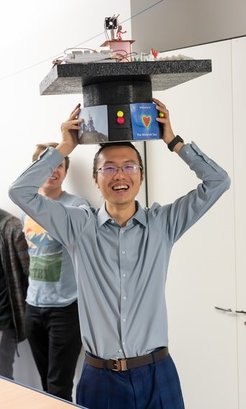Xing-Yan Chen: Controlling polar molecules with microwaves
His dissertation "Microwave-shielded ultracold polar molecules" pioneered the control of ultracold polar molecules with microwave and the formation of tetratomic molecules.
Xing-Yan Chen pursued his PhD project in the Quantum Many Body Systems division. His work, supervised by Xin-Yu Luo and Immanuel Bloch, focuses on the creation and manipulation of ultracold molecules. Specifically, he demonstrated a new type of scattering resonances between polar molecules, and used these resonances to bind two molecules into a "supermolecule".

In his research project, Xing-Yan illustrated that if the molecules carry an asymmetrically distributed charge – physicists refer to this as polarity – they can combine in an electrical field to form weakly bound "supermolecules". These "supermolecules" are bounded much weaker than typical chemical bonds, resulting in a bond length more than 100 times longer than normal molecules. Thanks to its long-range nature, these molecules are susceptible to external electromagnetic fields. As a result, their properties, such as size and shape, can be varied by a microwave field.
Xing-Yan's research is set to have immediate and far-reaching implications. As the method he developed is universally applicable to a wide range of molecular species, it provides a general methodology for experiments aiming to explore a wider variety of ultracold polyatomic molecules. Looking further ahead, the findings could pave the way for exploring novel quantum matters.
Xing-Yan started his master's thesis at MPQ in 2018 and continued to finish his PhD in 2023. He is grateful for his time at MPQ, stating, "MPQ is where my journey in experimental physics began. I experienced many memorable moments both inside and outside the lab." Highlights from his time in the lab include his first observation of scattering resonances and the formation of a "supermolecule". “But there were also frustrating moments”, he continues, “for example when I accidentally smoked a glass cell with a burnt UV LED or when I struggled with machine stability.” Outside the lab, he fondly recalls dining and hiking with colleagues, as well as the group retreats.
What’s next?
Xin-Yang Chen currently works as a postdoctoral researcher in the Quantum Many Body Systems Division at MPQ. In August, he will move to Princeton where I will continue his research on molecules.












